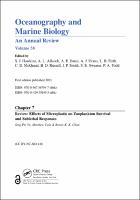Chapter 7 Review: Effects of Microplastic on Zooplankton Survival and Sublethal Responses
Proposal review
Author(s)
Yu, Sing-Pei Yu
Cole, Matthew Cole
Chan, Benny K. K.
Language
English[eng]Abstract
Microplastics (MPs) are a prolific contaminant in aquatic ecosystems across the globe. Zooplankton (including holoplankton and meroplankton) play vital ecological roles in marine and freshwater ecosystems and have been shown to readily consume MPs. The present review uses 88 pieces of published literature to examine and compare the effects of MPs on survival, growth, development, feeding rate, swimming speed, reproduction, organ damage and gene expression of different groups of zooplankton including copepods, daphnids, brine shrimp, euphausids, rotifers and the larvae of fishes, sea urchins, molluscs, barnacles, decapods and ascidians. Among the groups studied, daphnids and copepods are the most sensitive to MPs, with their feeding rate and fecundity significantly decreased at environmentally relevant MP concentrations. This might adversely affect daphnids and copepods populations in the long term. In contrast, molluscs, barnacles, brine shrimp and euphausids appear to be more tolerant to MPs. No clear impacts on survival, development time, growth or feeding rate can be observed in these zooplankton groups at any of the MP concentrations tested, suggesting that these groups might become more dominant with prolonged exposure to MP pollution. Leachates derived from MPs can induce severe abnormality in bivalve and sea urchin embryos. MPs have prominent effects on survival and fecundity of F1 offspring in bivalves, copepods and daphnids, indicating that MPs could incite transgenerational effects and drastically affect sustainability in zooplankton populations.
Keywords
Volume, Todd, Swearer, Smith, S, Russell, Review, P, OMBAR, Oceanography, Marine, L, I, Hawkins, Firth, Evans, Biology, Bates,B, Annual, AllcockISBN
9780367367947, 9780429351495, 9780367524722Publisher
Taylor & FrancisPublisher website
https://taylorandfrancis.com/Publication date and place
2020Imprint
CRC PressClassification
Marine biology


 Download
Download